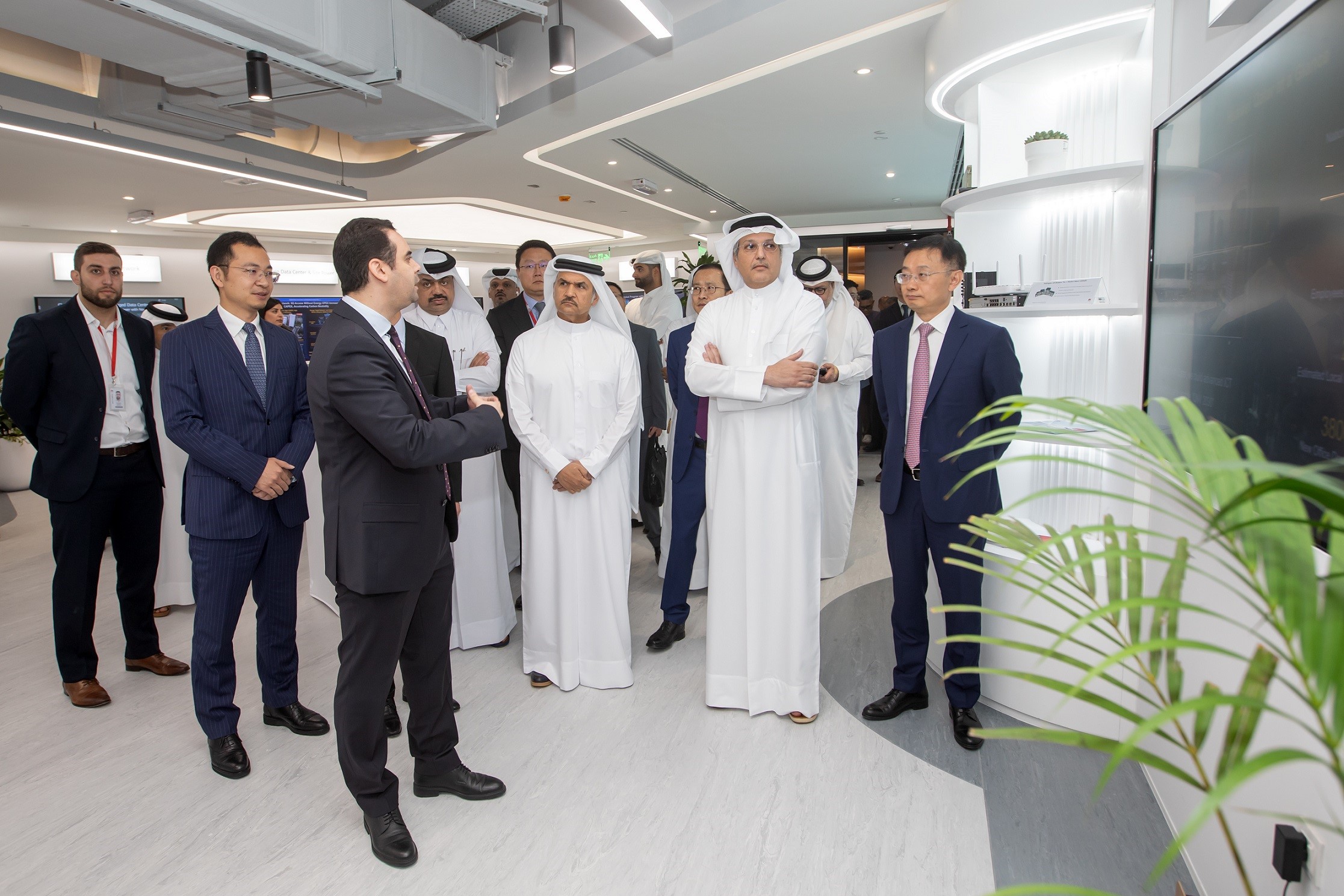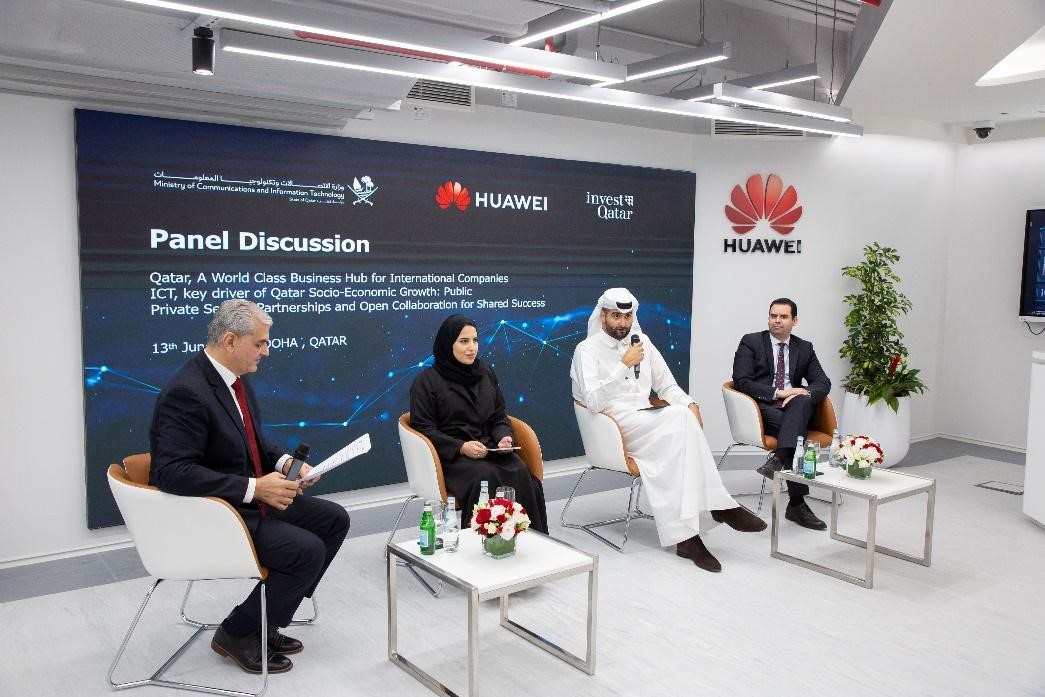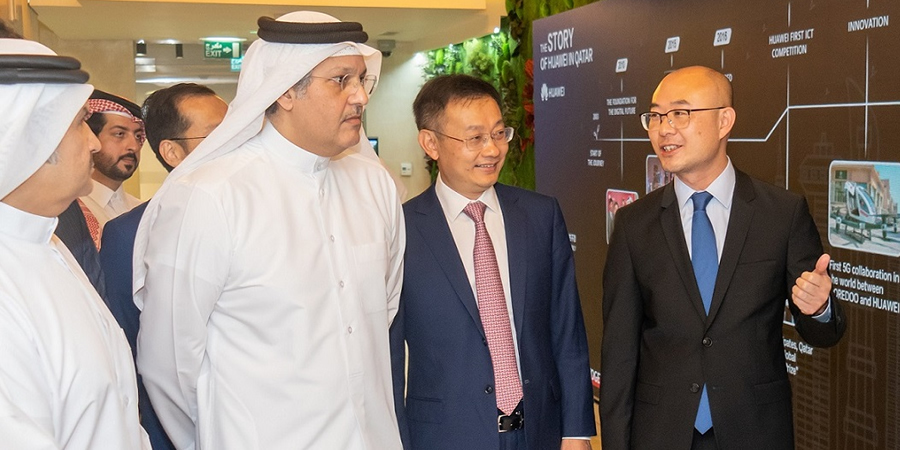In line with its expansion plans in Qatar and its commitment to support the country’s digital transformation, ICT ecosystem and digital economy, Huawei opened a new state-of-the-art Qatar office in the UDC Tower, The Pearl Island, Qatar.
The new 4,000-square-meter office will house Huawei’s main Qatar operation team and will help meet the future needs of the company’s growing workforce. The move reaffirms Huawei’s long-term commitment to Qatar and is a milestone in the company’s expansion plan targeted at enhancing its presence, activities, offerings and contributions to the Qatar market to achieve its mandate to play a key role in achieving the country’s digital transformation goals.
The new office inauguration was attended by His Excellency Mohamed bin Ali Al Mannai, Minister of Communications and Information Technology, and senior representatives from the Investment Promotion Agency of Qatar (IPA Qatar), United Development Company (UDC), Embassy of the People’s Republic of China in the State of Qatar and the Huawei management team led by Steven Yi, President, Huawei Middle East and Central Asia.

Huawei’s New Office Inauguration Ceremony in UDC Tower, The Pearl Island, Qatar
Commenting on Huawei’s new office opening, H.E. Mohamed bin Ali Al Mannai said: “Huawei is considered one of our important partners and is among the top leading companies in the field of information and communication technology. I am pleased to welcome Huawei's new expansion in Qatar. There is no doubt that this will contribute to enhancing digital innovation and creating new digital opportunities in the Qatari market.”
Steven Yi, President, Huawei Middle East and Central Asia, said: “Today’s new office opening is a commitment to our future in Qatar. We are proud of our history in the country, and Huawei will continue to support Qatar’s digital transformation through its cutting-edge technology solutions. I look forward to welcoming customers, partners, visitors and Huawei team members to our new office. I am confident that this expansion will drive further recruitment of elite talent who will take the lead in achieving the goals of the Qatar National Vision 2030, towards a leading sustainable digital society.”
Also Read: Huawei Shows Commitment Towards Qatar’s Digital Transformation
Huawei’s new office will host the company’s business operations, including Carrier Networks, Enterprise, Consumer, Cloud and Digital Power. In addition, the new office will play a critical role in managing the company’s CSR programs and initiatives in Qatar, such as Huawei’s flagship program, Seeds for the Future, the annual ICT Competition and the ICT Academy. The new office will also host an exhibition center that will function as an executive briefing center, showcasing many of the company’s products, solutions and advanced technologies in the ICT industry.
With a seafront and Qatar skyline view, Huawei’s new office has broad and open collaborative areas with natural light and beautiful landscapes. Inspired by the curves of ocean waves, functional spaces have been created to host meetings and demonstrate Huawei’s industry-leading technologies to its clients.
Panel Discussion in Collaboration With MCIT and IPA
Along the sidelines of the inauguration ceremony, Telecom Review was invited to attend an exclusive panel discussion entitled “Qatar, A World Business Hub for International Companies; ICT, Key Driver of Qatar Socio-Economic Growth: Public-Private Sector Partnerships and Open Collaboration for Shared Success.” Moderated by Ammar Tobba, VP, Public Affairs and Communications, Huawei Middle East and Central Asia, the distinct speakers included Eman Al Kuwari, Director of the Digital Innovation Department at the Ministry of Communications and Information Technology (MCIT); Fahad Ali Al-Kuwari, Senior Manager of Investor Relations, the Investment Promotion Authority (IPA); and Kamal Zian, Chief Cybersecurity and Privacy Officer – Gulf North Representative Office, Huawei.

From left to right: Huawei’s Ammar Tobba, MCIT’s Eman Al Kuwari, IPA’s Fahad Ali Al-Kuwari and Huawei’s Kamal Zian
In three rounds of questions, Tobba addressed each speaker, respectively, for their perspectives.
When asked about how much ICT contributes to Qatar’s GDP and what MCIT’s plans are to optimize this contribution, Al Kuwari stated that the industry is currently valued at $4.4 billion, which is 1.9% of the country’s overall GDP. They anticipate that “there is a sustainable growth potential” and that “it will continue to grow.” She also mentioned that there are numerous strategies and national programs set to launch soon that will effectively increase the impact of the ICT sector on the economy as a whole.
Partnerships with global technology providers like Huawei will enable this contribution to grow in terms of “technology transfer of expertise, infrastructure development, ICT training and much more.”
Artificial Intelligence (AI) is the current topic du jour in the technology world, representing seemingly endless opportunities for businesses and individuals alike, and such AI capabilities rely on cloud computing and connectivity. When asked about the ministry’s plans toward AI and cloud, Al Kuwari underscored that TASMU Smart Qatar’s program is built on these capabilities to bring better quality of life to citizens. This is where “multi-players can actually contribute to the infrastructure and where we can actually leap forward in terms of innovation.” She also cited Qatar’s AI strategy, which is built on six key pillars: data access, education, employment, business, research and ethics.
Sustainability and green energy are also among the key focuses of ICT. Through TASMU, MCIT has leveraged a lot of transport data through the telecom infrastructure. Al Kuwari firmly believes that “there’s a lot of potential with the data that were collected through telecom partners that they can come up with sustainability metrics to monitor and improve quality in the country.” MCIT is looking forward to engaging with the power of Huawei’s Digital Power business in this area.
Sharing details about IPA Qatar and its role in attracting foreign direct investment (FDI) to Qatar, Ali Al-Kuwari said that they have three separate concentrations: marketing, investor relations and policy advocacy. In a span of three years, they were able to achieve the massive accomplishment of placing Qatar as number 1 on the FDI standard watchlist for 2022.
Huawei is among the list of potential investors targeted by IPA Qatar due to the company’s leadership status in the sector. “The birthplace of 5G was all built by Huawei here in Qatar, so we understand that the footprint you can have and potentially have in the future is massive.”
Celebrating the opening of Huawei’s new office in Doha and expanding Huawei’s business in Qatar will undoubtedly have a ripple effect on attracting other global businesses. Ali Al-Kuwari explained that tech companies like Huawei “own the entire value chain” as they innovate, create technology and ultimately commercialize and sell it. Thus, a company the size of Huawei signals companies to identify the opportunity and decide to come to Qatar. “… Huawei has done their homework, and they find out Qatar is profitable… because money will always go where it’s treated best.”
Being such a large tech company based in the East, Huawei’s presence in Qatar also gives a vote of confidence to other companies, essentially signaling that “our country is open to do business with everyone.” Although the market is small, “the propensity to consume is high, and the accessibility to other markets is very, very large.”
Ali Al-Kuwari confirmed that last year, around 20% of FDI coming into Qatar was driven by tech, which is why he sees this industry as “foundational in all business expansion,” particularly in emerging sectors. “We'll see that percentage grow, but the challenge becomes, how do we, as a state, regulate the foreign direct investment into the country? And also, how do we maintain the relationship with incumbent investors like Huawei and others where the bottom line remains low, but we continue to progress and we have more demand?”
Indeed, public-private partnerships (PPP) are a “delicate strategy” that, when done right, benefit everyone, presenting the only kind of “win-win situation” in international commerce, especially when capital is moving between geographies.
For Zian’s part, Huawei’s commitment and success in Qatar can be credited to the support from partners and customers, aligned with the government’s National Vision 2030. “We have been contributing in building the national digital infrastructure,” Zian emphasized. In terms of implementing 5G, Qatar currently ranks number one globally in terms of customer experience.
This new office opening signifies that “we are committed to invest more into digital transformation, collaborating with our telco partners, enterprise partners, the government and public-private sectors to ensure that our collaboration is fruitful. We are able to achieve upgrading the current [National Broadband Network] infrastructure while keeping [the] leadership globally for Qatar,” Zian elaborated.
Standardization has helped Huawei become exemplary in the quality and security of its products and services. “It is really critical for us to build this communication with the industry about cybersecurity to build this trust bridge between us and our customers and make them feel comfortable using Huawei’s products and services because they know that Huawei has already been certified and scrutinized over the cybersecurity process.”
Zian contested the proposed comparison between 5G and 4G security, by confirming that the 5G standards, features and capabilities are certainly more secure as they adhere to key international standards like NESAS and other cybersecurity and privacy protection measures.
Lastly, when asked about how Huawei has helped Qatar achieve its sustainability goals, Zian mentioned two examples: 5G networks and data centers. While offering 10 times the speed, Huawei also offers 10 times more efficient power consumption. “We are developing technologies that not only provide the best experience to the user but, at the same time, balancing and contributing to the green target of Qatar’s National Vision 2030.”
Huawei Digital Power’s business unit is also focusing on optimizing the consumption of data centers and using AI as an enabler. In this regard, Zian expressed, “We are really going beyond the traditional power structure to be more intelligent, more saving and more efficient in terms of consumption.”
Huawei Partners With Industry and Ecosystem Leaders in Qatar
Huawei has been operating in the Qatari market since 2003 and currently works with both telecom providers — Ooredoo and Vodafone Qatar — serving approximately two million people in the country. Huawei is also actively cultivating local ICT talents to contribute to Qatar’s ICT ecosystem. Last year, Huawei expanded its STEM and education initiatives through its flagship CSR program, “Seeds for the Future,” the annual Huawei ICT Competition and the Huawei ICT Academy to further support the country’s core focus on innovation both now and in the years to come.
Moreover, United Development Company (UDC), the master developer of Pearl Island and Gewan Island, signed an agreement last year with Huawei to boost the characteristics of smart cities by designing and integrating innovative solutions at Pearl Island. Additionally, last year at Milipol Qatar 2022, the UDC extended its partnership with Huawei to deploy its smart campus system at the new UDC development at Gewan Island.
During the FIFA 2022 World Cup, ensuring the resilience of the national network infrastructure was a top priority, and Huawei, as a key partner of the telecom service providers, played a crucial role in achieving smooth network operation, service quality and security throughout the event.
They worked closely with the main telecom players in the Qatari market, supporting them with smart, fast and innovative solutions to expand the network capacity and capability to ensure readiness for the high demand during the entirety of the FIFA event.
In summary, and as demonstrated by the new office unveiling, Huawei believes that digital transformation will be the strongest support for Qatar’s national objectives. Indeed, the company remains committed to utilizing its global expertise and capabilities to pave the way for Qatar's digital transformation and drive its advanced phases into the future.











